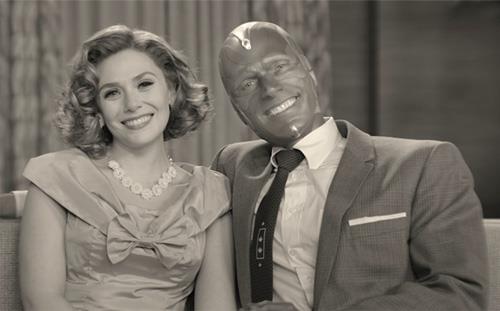
You might call it a toss-up as to which is further from reality: the Marvel Cinematic Universe (MCU), with its crazy gang of off-center superheroes, or the universe of the 1950s suburban television sitcom.
Whichever way you might lean on that question, you have to admit it's an inspired idea to mash the two universes together, which is what the Marvel folks have done with WandaVision, a half-hour series that premieres Friday on Disney+.
The result is that rarest of birds, a TV show that's unlike pretty much everything else on television. That's an impressive feat and not a bad thing.
Wanda Maximoff (Elizabeth Olsen) and Vision (Paul Bettany), characters whose relationship in Marvel comics dates back decades, are given a new prominence here and quickly prove charming enough to carry their own show.
They play a married couple who bring their superpowers to that 1950s sitcom world – where no one thought superpowers were necessary because everything seemed to be perfect.
Everything wasn't, of course, and it still isn't – including Wanda and Vision. But WandaVision starts by seeming to accept the premise, basing its first stories on the kind of small, harmless misunderstandings and mix-ups that generated the humor in those sitcoms.
"Oh, hon, I didn't know you were bringing the boss home for dinner!"
WandaVision captures the spirit of those minidramas, which were standard fare at the time and now seem almost encased in amber.
Wanda and Vision start the show with the modest goal of simply fitting into a 1950s sitcom neighborhood. They'd just as soon their neighbors in Westview don't witness their particular talents, like how Wanda can command inanimate objects to move or how Vision can process data at his office 300 times faster than his fellow workers.
They make the occasional slip, like when someone offers Vision a bite to eat and he says no thanks, he doesn't eat food.
Being an android, he doesn't. But that's not the way to fit in. So he has to think of a quick explanation for why he said that. And he does, and all the people around him nod and accept it.
It all feels a little silly and superficial, which is exactly the point: that the '50s sitcom world was an artifice, a place we wanted to believe in as opposed to a place that existed.
WandaVision goes all-in on that world. It films in black and white. It outfits Wanda in June Cleaver dresses. It pumps up the laugh track and gives the happy couple a pack of superficial neighbors, notably including the nosy Agnes (Kathryn Hahn) and the sympathetic Geraldine (Teyonah Parris).
Geraldine's presence does violate the total '50s aura of the show since there were rarely Black characters on television in the '50s.
But then – spoiler alert – WandaVision aspires to be more than a '50s sitcom satire. When the Marvel Cinematic Universe kicks in, worlds collide, and the show's initial burst of good, fluffy, fun morphs into more of a hybrid.
Marvel and Disney+ are trying something very tricky here, and they don't nail every nuance on the first try. But in some ways, that makes the show more interesting because we can watch as it's putting itself together.
As all this suggests, viewers who know the MCU will get more out of WandaVision, picking up nuances that will sail past a first-timer.
But the performances by Olsen and Bettany stand on their own. Even if you can't name all of the Avengers, you can appreciate Wanda and Vision.
The Marvel world was built in some measure on the frustrating truism that you can't always get what you want. The '50s sitcom world was built on everything being exactly as we wished. Let the games begin.